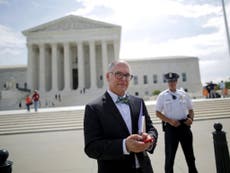It is hard to say just when the gay-marriage train really started to roll in the United States, a country that still has conservative instincts on many social issues and where faith and God remain louder forces than in Europe. Massachusetts set the template, becoming the first state of the union to allow same-sex marriage 11 years ago. It was three years ago last month when President Barack Obama finally offered his support.
The speed of change has been dizzying or shockingly slow, depending on how you see it. Today, gay marriage is on the books in 37 states. Few gay Americans would have seen that coming even a few years back. On the other hand, the lesbian, gay, bisexual and transgender community has been united in demanding equal rights since the Stonewall riots in New York nearly half a century ago. Their battle spanned the original Aids epidemic that took the lives of loved ones whom, for lack of spousal rights, they couldn’t even visit in hospital for last goodbyes.
It is appropriate that it is at the height of this gay pride month that the US Supreme Court is weighing up a case that will see it decide finally whether the US Constitution actually requires that the nation as a whole gives gay people exactly the same protections and rights to take the vows of marriage as straight people. If that is their conclusion, gay marriage will become the national norm in the United States.
Few institutions are more obscure than America’s top court. We can’t even tell when this decision will be issued. It should be before June ends, and the next day that decisions will be issued is 25 June. But there seems to be a widespread expectation among legal experts that the Court wouldn’t have taken up this case, which involves challenges to gay-marriage bans in four states – Tennessee, Kentucky, Michigan and Ohio – if it didn’t mean to settle the issue once and for all. Or try to.
The key vote will be that of Justice Anthony Kennedy. Among the nine justices on the Court, he generally sides with the four conservatives, not with his four liberal colleagues appointed by Democrat presidents. Yet he also has a record of expanding gay rights where possible.
At the oral arguments in this case, it was Justice Kennedy who raised the same question of speed of change. “This definition [of traditional marriage] has been with us for millennia,” he said. “And it’s very difficult for the court to say, ‘Oh, well, we know better.’” That gave those on the side of gay marriage a fit of jitters. At issue in this case: does the Constitution require every state to issue licences to same-sex couples to marry? If it does not, must every state recognise same-sex marriages conducted in states that do allow them?
The big argument from the other side was that opening the institution of marriage to same-sex couples will weaken it. That, they say, is because it rests on the notion that people marry to procreate. Give membership to gays and straight people will give up on it in even greater numbers than they are already.
This is silly. You hardly need a statistical study to show that there has not been a collapse in the heterosexual marriage in those states that already have gay marriage on their books.
Just as racism is usually about fear of the other taking away what you have, so it is with homophobia and resistance to gay marriage. Both are fed by bigotry. When it comes to gay marriage at least, fear and ignorance have already largely given way in the United States to humanity and compassion. Sometimes slowly, but quickly too. Now it is the Court’s turn to bring that happy shift to completion.


Join our commenting forum
Join thought-provoking conversations, follow other Independent readers and see their replies